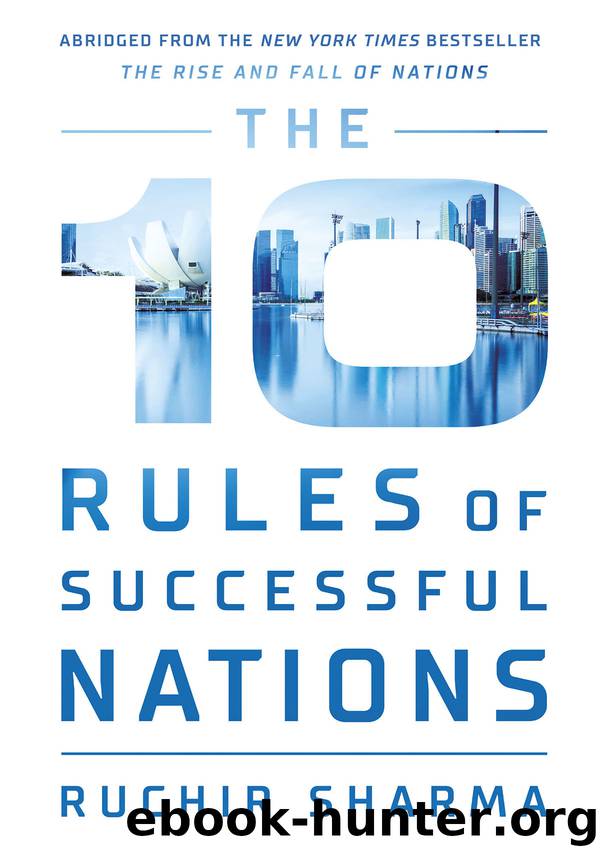The 10 Rules of Successful Nations by Ruchir Sharma

Author:Ruchir Sharma
Language: eng
Format: epub
Publisher: W. W. Norton & Company
Published: 2020-02-11T00:00:00+00:00
____________
* Throughout this chapter, investment as a share of GDP refers to total investment, public plus private.
7
INFLATION
Successful Nations Control the Real Inflation Threats
No subject in economics is more paralyzed by traditional thinking than inflation, a term that generally refers only to the pace of increase in consumer prices, a once ubiquitous threat that has largely vanished in recent decades.
Consumer prices were rising at a double-digit pace and wreaking economic havoc all over the world until the early 1980s, when they began to recede under pressure from rising global competition and a concerted attack by central banks. Raising interest rates to painful heights, central banks choked off money flows and won the war on inflation just about everywhere. Between 1981 and 1991, the average rate of inflation in developed nations fell from 12 percent to just 2 percent, where it remains today.
Meanwhile, in emerging nations, the average rate of inflation peaked at a staggering 87 percent in 1994 and reached the hyperinflationary triple digits in major countries like Brazil and Russia. Then, over the subsequent decades, it receded to its current, much calmer rate of just 4 percent.
Those averages are still very useful as benchmarks for judging when inflation may be too high. Any emerging nation with a rate of inflation much above 4 percent, or any developed nation with a rate much above 2 percent, has cause for concern. In a world where double- and triple-digit consumer price inflation is a rare threat, the outliers are worth watching closely because they are out of balance and seriously at risk.
The traditional view of high consumer price inflation—that it is a growth-killing cancer—still holds true. In the short term, rapidly rising prices compel central banks to raise interest rates, making it more expensive for businesses and consumers to borrow. High inflation also tends to be volatile, and its swings make it impossible for businesses to plan and invest for the future. Over the longer term, inflation erodes the value of money sitting in the bank or in bonds, thus discouraging saving and shrinking the pool of money available to invest in future growth.
The rub is that central banks are now fighting a very different war. In the slow-growth environment that took hold after the crisis of 2008, central banks often worry that inflation may be too low, not too high. In developed countries, instead of raising rates to make sure inflation doesn’t increase to far above a target of 2 percent, they now cut interest rates when inflation is falling too far below 2 percent. Their big fear is that low inflation will lead to outright deflation—the dreaded but overblown “Japan scenario.”
History, in fact, shows that neither low inflation nor deflation are necessarily bad for economic growth. Japan suffered a rare bout of “bad deflation” after the collapse of its stock and housing bubbles in 1990. Consumer demand dried up, prices started to fall, and shoppers began delaying purchases in the expectation that prices would fall further. The downward spiral depressed growth for two decades.
Download
This site does not store any files on its server. We only index and link to content provided by other sites. Please contact the content providers to delete copyright contents if any and email us, we'll remove relevant links or contents immediately.
International Integration of the Brazilian Economy by Elias C. Grivoyannis(108623)
The Radium Girls by Kate Moore(12013)
Turbulence by E. J. Noyes(8040)
Nudge - Improving Decisions about Health, Wealth, and Happiness by Thaler Sunstein(7689)
The Black Swan by Nassim Nicholas Taleb(7102)
Rich Dad Poor Dad by Robert T. Kiyosaki(6600)
Pioneering Portfolio Management by David F. Swensen(6281)
Man-made Catastrophes and Risk Information Concealment by Dmitry Chernov & Didier Sornette(6001)
Zero to One by Peter Thiel(5782)
Secrecy World by Jake Bernstein(4739)
Millionaire: The Philanderer, Gambler, and Duelist Who Invented Modern Finance by Janet Gleeson(4461)
The Age of Surveillance Capitalism by Shoshana Zuboff(4273)
Skin in the Game by Nassim Nicholas Taleb(4235)
The Money Culture by Michael Lewis(4194)
Bullshit Jobs by David Graeber(4177)
Skin in the Game: Hidden Asymmetries in Daily Life by Nassim Nicholas Taleb(3987)
The Dhandho Investor by Mohnish Pabrai(3757)
The Wisdom of Finance by Mihir Desai(3726)
Blockchain Basics by Daniel Drescher(3572)
